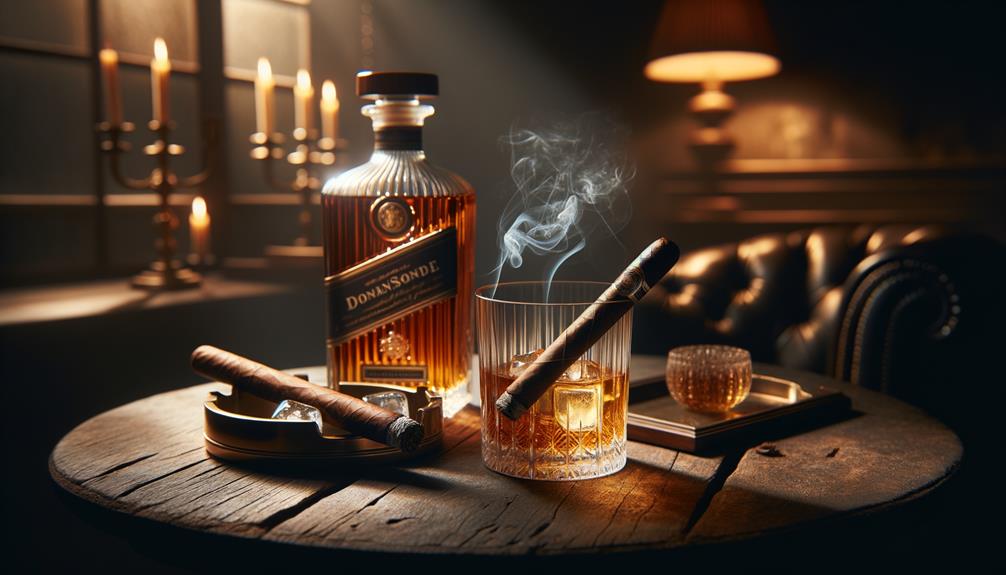Pairing whisky and cigars is akin to crafting a masterpiece, where every note and rhythm must harmonize to create a sublime experience. The interplay between the rich, velvety tones of a fine bourbon and the earthy, smooth flavors of a well-aged cigar is an art form that requires a deep understanding of both. The age and region of a whisky greatly influence its flavor profile, and similarly, the complexities of a cigar's blend can elevate the pairing to new heights. To achieve this delicate balance, one must consider these nuances to create an unparalleled sensory experience.
Let me know if you need any further modifications!
Understanding Flavor Profiles
Understanding Flavor Profiles
To truly appreciate the intricate dance between whisky and cigars, it's crucial to grasp the nuanced flavor profiles that each brings to the table. Cigars present a rich array of flavors, influenced by the origin of the tobacco, aging duration, and the type of wrapper leaf. For instance, cigars from the Dominican Republic often offer notes of nuts and spices, while those from Nicaragua bring earthy, chocolatey undertones.
On the other hand, whisky, whether bourbon or Scotch, contributes its own complex flavors. Bourbon typically showcases notes of caramel, vanilla, butterscotch, coconut, and chocolate, creating a sweet and rich profile. Scotch, however, offers a more diverse spectrum ranging from peaty and smoky to hints of sea salt, tobacco smoke, and spice.
When pairing these two indulgences, the goal is to find complementary or contrasting notes that enhance the overall experience. A cigar with coffee and leather undertones pairs beautifully with a bourbon's caramel richness, while a peaty Scotch might harmonize with the earthy, spicy notes of a Nicaraguan cigar. Grasping these flavor profiles is vital for a sophisticated and innovative pairing, elevating the enjoyment of both cigar and whisky.
Selecting the Right Whisky
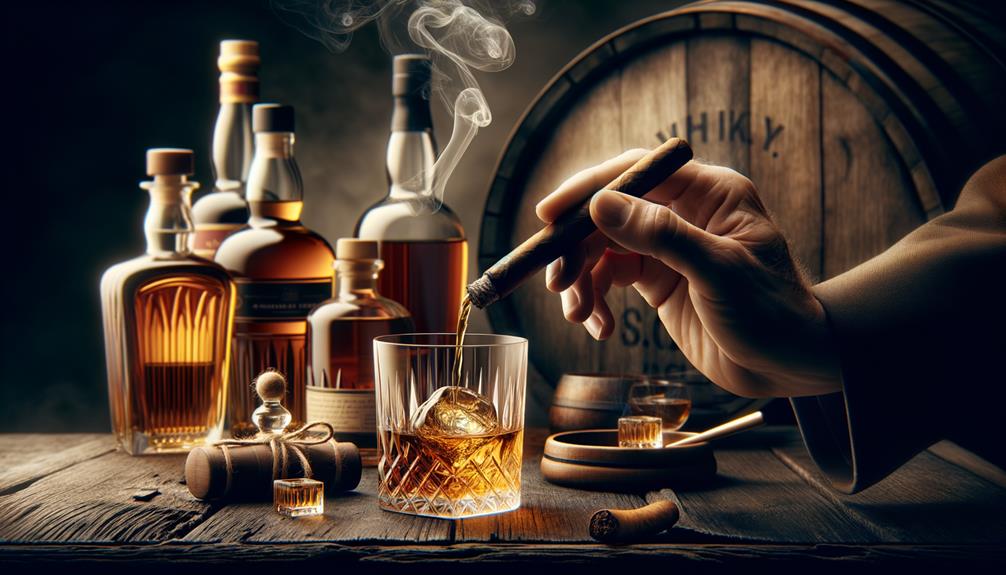
When it comes to selecting the right whisky, I consider the intricate flavor profiles that range from light and floral to rich and smoky. The age and maturation process of the whisky are also crucial, as older whiskies tend to offer more complexity and depth. Additionally, the region and distillery where the whisky is produced impart unique characteristics that can either complement or contrast with your chosen cigar.
Whisky Flavor Profiles
When it comes to whisky and cigars, finding the perfect match is an art that requires a deep understanding of their intricate flavor profiles. Whisky, for instance, can range from the rich caramel and vanilla notes of bourbons to the complex peaty and smoky characteristics found in scotches.
To create complementary pairings, it's essential to consider the aging duration of both products. A well-aged whisky, with its layered flavors, can beautifully complement the depth of a cigar matured over several years. For example, a bourbon's sweetness and hints of butterscotch can harmonize beautifully with a cigar featuring nutty and chocolate undertones, often found in premium tobacco from regions like Nicaragua and the Dominican Republic.
If you're exploring peaty scotches, their intense smoky, salty notes can pair excellently with cigars that have earthy, leathery flavors, typically seen in tobacco from Ecuador or San Andrés in Mexico. The key to a perfect pairing lies in balancing the robust profiles of whisky with the nuanced flavors of cigars. By doing so, you can elevate the sensory experience, allowing both the drink and the smoke to enhance each other, creating an unparalleled indulgence for the refined palate.
Age and Maturation
Here's the rewritten text:
The age and maturation of whisky significantly influence its flavor profile, making it crucial to consider these factors when selecting the right bottle for a perfect pairing. As whisky ages in oak barrels, it undergoes a transformation that shapes its character. The longer it matures, the more depth and complexity it gains, with flavors like vanilla, caramel, and spice emerging. When pairing whisky with cigars, it's essential to understand these transformations to achieve a harmonious match.
Let's examine the differences:
| Age | Flavor Profile |
|---|---|
| Young (3-8 years) | Raw, vibrant, spirited |
| Intermediate (9-15 years) | Balanced, complex, smooth |
| Old (16+ years) | Rich, deep, sophisticated |
Younger whiskies often display raw, vibrant notes that can clash with the robust flavors of aged cigars. Intermediate-aged whiskies offer a balanced, complex profile, making them versatile for pairing. Meanwhile, older whiskies, with their rich and deep flavors, complement the sophistication of premium cigars.
To achieve a successful pairing, it's vital to match the intensity and complexity of both whisky and cigars. By grasping the nuances of age and maturation, we can select a whisky that elevates the cigar experience. Choose wisely, savor deeply, and let the flavors meld together.
Region and Distillery
Understanding the influence of region and distillery on whisky's character is crucial when pairing with cigars. Regional diversity plays a significant role, as whiskies from different regions offer distinct profiles. For example, Scottish whiskies from Islay, known for their peaty and smoky essence, create a bold contrast to rich, earthy cigars. On the other hand, sweet Kentucky Bourbon, with its notes of caramel and vanilla, provides a delightful harmony with milder cigars.
Exploring renowned distilleries is vital. The Macallan and Glenfiddich offer a spectrum of flavors, ranging from sherry sweetness to oaky richness, which can complement various cigar types. Buffalo Trace's robust Bourbon or Jameson's smooth Irish whiskey brings distinct characteristics to the table, ensuring a balanced pairing. However, innovation lies in discovering craft distilleries and small-batch producers. These unique whiskies, with their experimental mash bills and aging processes, offer uncharted territories for pairing.
Understanding the flavor profiles – whether it's the smoke of a peaty Islay Scotch or the sweetness of a Kentucky Bourbon – allows for an enriched whisky and cigar experience, transforming each sip and puff into a symphony of flavors.
Choosing the Perfect Cigar
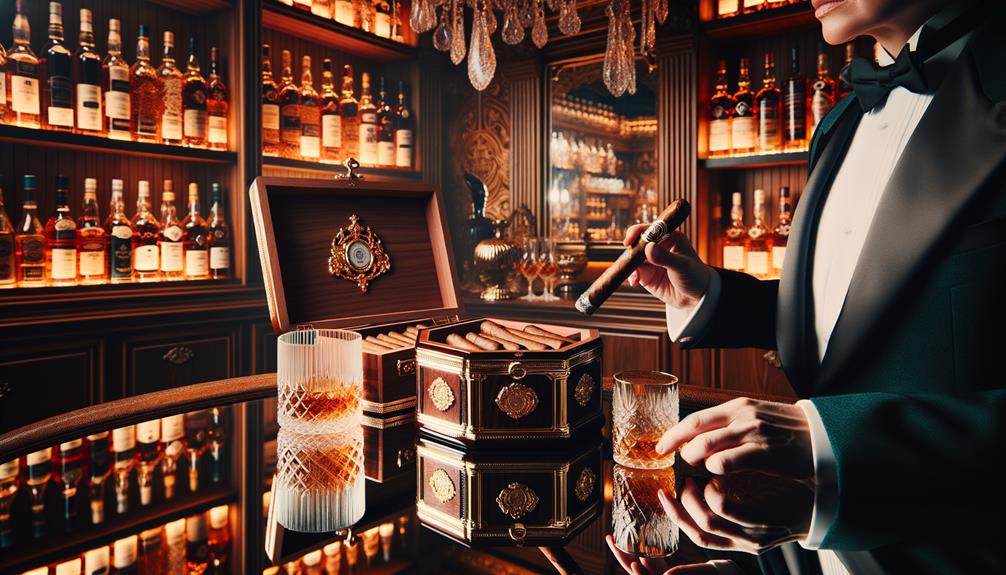
When it comes to choosing the perfect cigar, I consider three key factors: strength, wrapper leaf variety, and overall flavor profile. The origin and aging of the tobacco play a significant role in defining the taste, whether it's a spicy Nicaraguan or a smooth Connecticut. By understanding these elements, I can pair them expertly with a whisky's nuanced flavors.
Understanding Cigar Strength
Understanding Cigar Strength
When it comes to selecting the perfect cigar, understanding its strength is crucial. The strength of a cigar is largely determined by the tobacco fillers and wrappers used. Maduro wrappers, for instance, are known for their bold, intense flavor, while Natural wrappers produce a milder profile. Fillers from regions like Cuba, Nicaragua, and the Dominican Republic also contribute to the overall strength of a cigar, ranging from light to strong.
A strong cigar, typically wrapped in Maduro leaves, delivers a rich, robust flavor that pairs beautifully with a full-bodied whisky. On the other hand, a lighter cigar with a Natural wrapper is better suited to a more delicate whisky, allowing both to shine without overpowering each other.
To achieve the perfect whisky pairing, it's essential to match the intensity of the cigar with the whisky. This balance ensures neither the cigar nor the whisky overshadows the other, allowing their complex flavors to meld seamlessly. This harmonious pairing transforms a simple combination into a sophisticated, sensory experience.
Wrapper Leaf Varieties
To truly appreciate the art of cigar and whisky pairing, it's essential to delve into the diverse world of wrapper leaf varieties. The choice of wrapper leaves significantly contributes to a cigar's flavor profile. From the light Connecticut Shade to the dark Maduro, each wrapper type profoundly affects the tasting experience.
Connecticut Shade wrappers provide a smooth, mild taste, making them ideal for those new to pairing cigars with whisky or rum. On the other hand, Habano wrappers offer a medium-bodied experience with spicy notes, which complement a peaty Scotch or a spicy bourbon. Maduro wrappers, aged longer for a richer flavor, deliver bold and complex profiles with hints of chocolate, coffee, and sweetness – perfect for pairing with a robust whiskey or a dark rum.
For those seeking an intense experience, Oscuro wrappers, the darkest and oiliest, present full-bodied flavors with espresso, leather, and earthy notes. Choosing the right tobacco leaves for your cigar is crucial, as it can elevate the overall pairing experience with your preferred whisky. Whether you're selecting a cigar in a Natural wrapper for its subtlety or a Maduro for its depth, understanding wrapper leaves will refine your pairing skills.
Flavor Profile Considerations
When pairing a cigar with whisky, it's essential to consider the intricacies of their flavor profiles. The unique characteristics of a cigar's tobacco, influenced by regions like the Dominican Republic, Nicaragua, and Ecuador, can greatly impact the pairing. Each region brings its distinct terroir and craftsmanship, resulting in diverse flavor notes such as nuts, coffee, spices, wood, chocolate, earth, and leather.
When selecting a cigar to pair with your whisky, think about how the flavors will interact. For instance, bourbon, with its rich notes of caramel, vanilla, butterscotch, coconut, and chocolate, can enhance a cigar's creamy and sweet undertones. On the other hand, Scotch whisky, known for its peaty, smoky, and sea salt characteristics, can create an intriguing contrast with a cigar's earthy and spicy profile.
Rum is another spirit worth exploring in cigar pairing. The molasses and tropical fruit notes of aged rum can add a layer of complexity to cigars from regions like Connecticut and San Andrés in Mexico. By taking a thoughtful approach to understanding these flavor profiles, you can ensure that each puff and sip are a harmonious combination.
Pairing Techniques
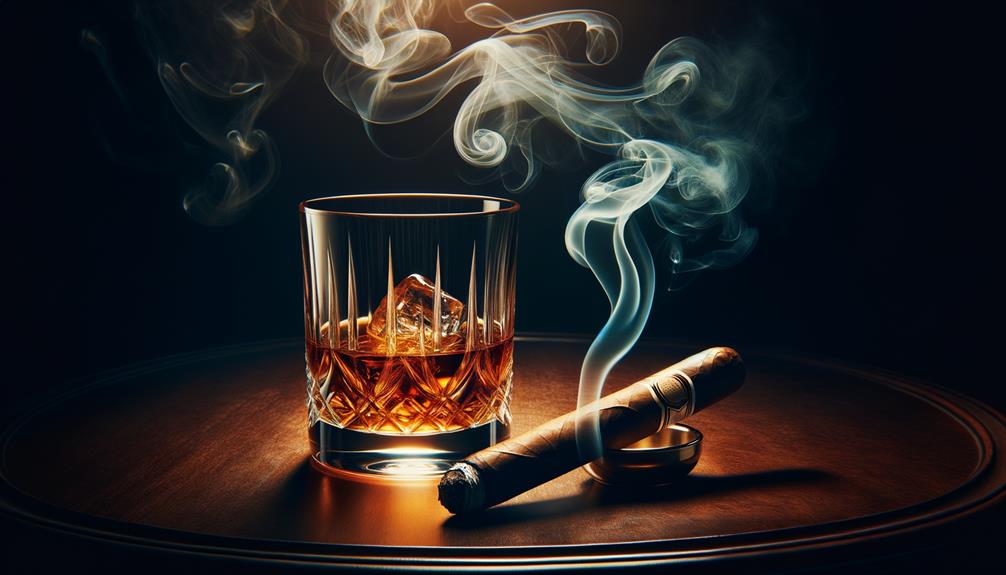
When pairing cigars and whiskey, it's crucial to consider the intensity and flavor profiles of both to create a harmonious experience. For instance, a medium-bodied Nicaraguan cigar wrapped in Maduro offers a rich, complex flavor that pairs beautifully with a smooth bourbon like Angels Envy. This combination is reminiscent of the evolved rum production methods that balance sweetness and depth.
Imagine a spicy Cuban cigar paired with a robust Scotch; the warmth and spice of the cigar intertwine with the peaty notes of the whiskey, creating a complex dance of flavors. Alternatively, light cigars often complement rum or brandy, evoking a sense of timeless sophistication.
For those seeking innovation, consider how the rich, nutty essence of a full-bodied cigar can echo the complexity of a full-bodied whiskey, where leather and baking spices converge. Understanding these nuances is vital for curating an exceptional pairing experience. The alignment of intensity and complementary flavors not only enhances each element but also elevates the entire sensory journey.
Intensity and Strength
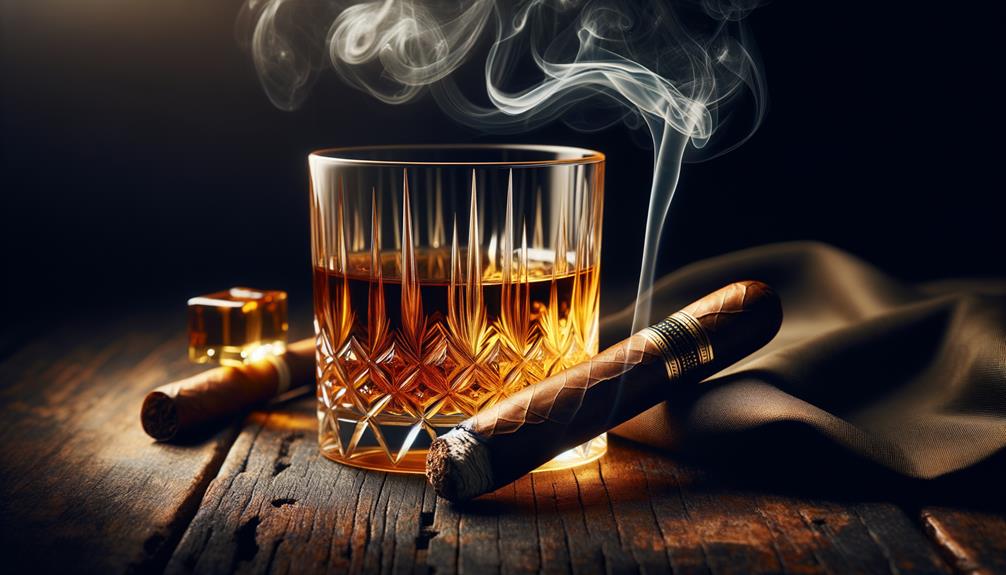
Mastering the art of balancing intensity and strength when pairing cigars with whisky requires a deep understanding of cigars' flavor profiles. The wrapper and filler play a significant role in determining a cigar's strength and intensity. For instance, a Maduro wrapper imparts a rich, bold flavor, often preferred for pairing with equally strong whiskies. On the other hand, lighter wrappers offer a more subdued flavor, which requires a more nuanced whisky.
To master this art, consider the following key factors:
Wrapper types greatly impact the flavor profile, with Maduro wrappers contributing up to 60% of the flavor. This knowledge helps in selecting a whisky that can match or complement the intensity.
The origin of the filler tobaccos also affects the intensity level. Cuban fillers often bring a bold, strong profile, while Nicaraguan and Dominican fillers offer a range of strengths.
When selecting a whisky, consider its characteristics, such as whether it's peaty, smoky, or smooth. Strong cigars pair well with peaty whiskies, while medium cigars might be better suited to a smooth, complex whisky.
Ultimately, your personal preference is the guiding force. Experiment with different combinations to find the perfect balance for your palate.
Balance is key to a harmonious tasting experience. Ensure neither the cigar nor the whisky overpowers the other, allowing you to appreciate the nuances of both.
Complementary Flavors
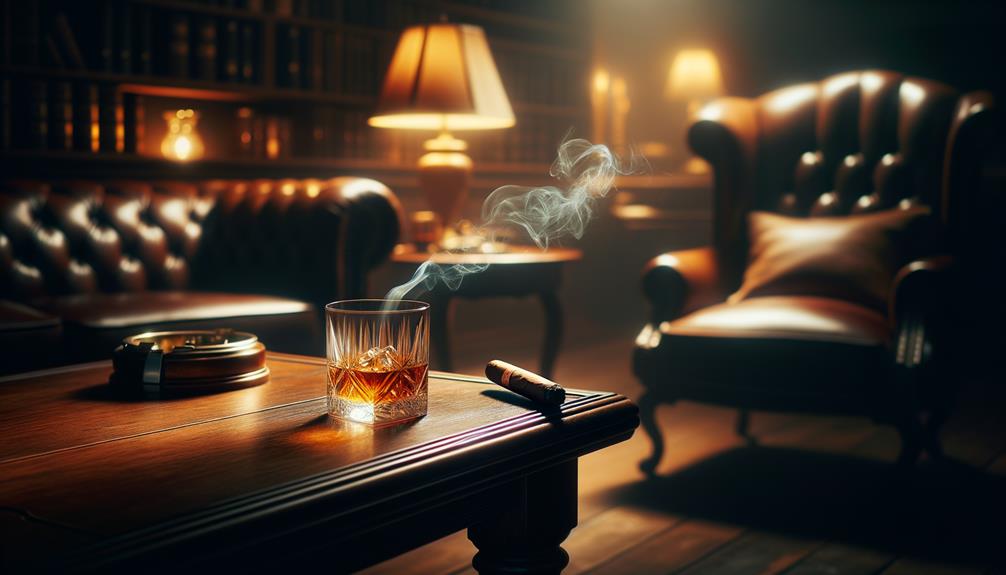
Exploring the intricate dance of complementary flavors between whisky and cigars requires a deep appreciation of each element's unique tasting notes. With a refined palate, I delve into the symphony of cigar flavors and whiskey pairings, seeking harmonious and pleasant flavor combinations.
Cigars, like whiskies, boast a wide range of tasting profiles, from nutty and leathery to chocolatey and spicy. When pairing these flavors, it's crucial to match these profiles carefully. For example, robust Cuban cigars often pair beautifully with whiskies like GlenAllachie 12 or Macallan 18. GlenAllachie's caramel and oaky undertones blend seamlessly with the earthy richness of a Cuban cigar, while Macallan 18's sherry sweetness enhances the cigar's complex character.
Scotch whisky offers a broad spectrum of flavors, from the peaty smokiness of Islay malts to the fruity elegance of Speyside varieties. This mirrors the diverse cigar flavors, creating endless possibilities for innovative pairings. By identifying shared notes – such as the peaty sharpness in an Islay malt and the robust spice in a Nicaraguan cigar – we craft a pairing that elevates the tasting experience.
Ultimately, understanding each element's tasting profiles allows us to create perfectly balanced, complementary flavor combinations that delight the senses.
Common Pairing Mistakes
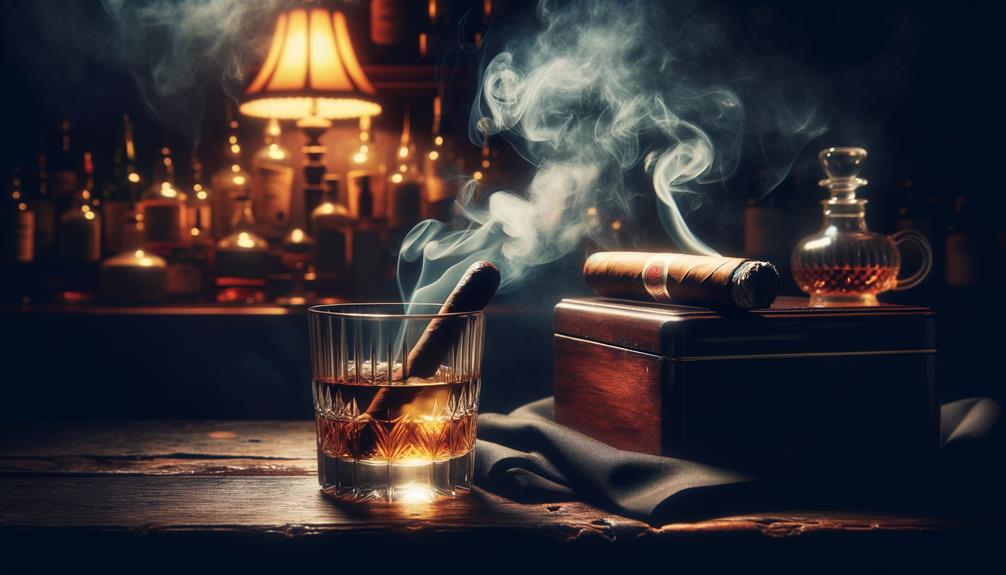
Pairing whisky and cigars can be a sophisticated experience, but it's easy to fall into common traps that detract from the harmony. For instance, pairing similar flavor profiles can lead to a one-dimensional experience. When the whisky and cigar share too many characteristics, the complexity gets lost, and the pairing becomes bland.
Another mistake is smoking on an empty stomach. Especially with strong cigars, the nicotine effects can be overwhelming, making it difficult to enjoy both the cigar and the whisky. Having a well-rounded meal beforehand can mitigate this issue.
To enhance your pairing experience, consider the following pitfalls:
- Ignoring cigar flavor notes can lead to mismatched pairings.
- Underestimating nicotine effects can be potent, so it's crucial to pace yourself.
- Lack of specific pairings can result in a less refined experience.
- Relying on similar flavor profiles often results in a one-note experience, lacking in depth.
- Neglecting to balance intensity can overwhelm one of the components, whether it's a mild cigar with a robust whisky or vice versa.
Expert Recommendations
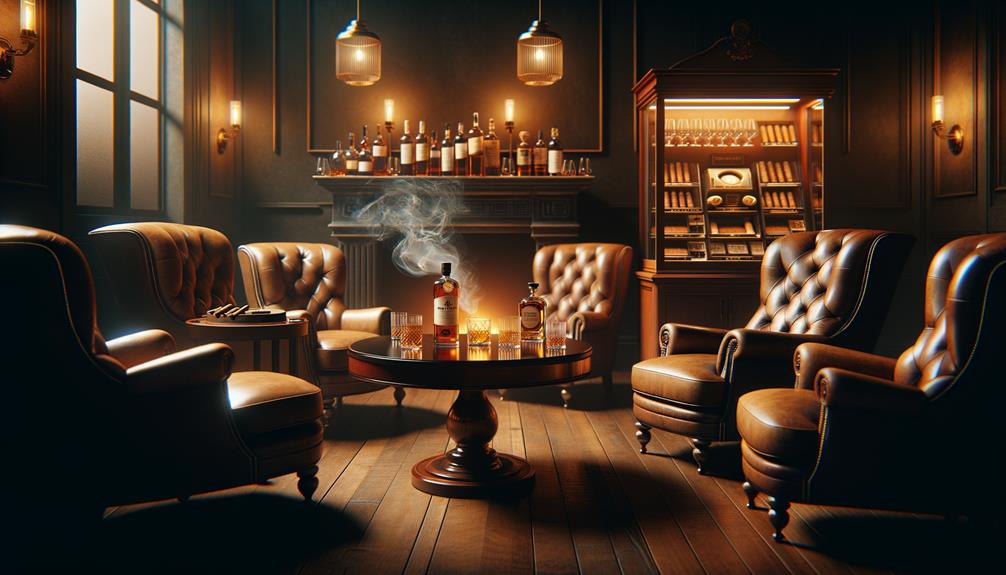
To elevate your whisky and cigar pairing experience, let's delve into expert recommendations that promise a harmonious balance and a richly layered tasting journey. For instance, the Laranja Reserva Corona Gorda pairs beautifully with a single malt Scotch like Ledaig 10-Year. The rich, full-bodied nature of the cigar, wrapped in Maduro, complements the peaty and smoky tasting notes of the Scotch, creating an exquisite sensory interplay.
Another expert-recommended pairing is the Montecristo Espada Ricasso with Spey River Speyside Scotch. This combination is designed to delight, as the cigar's complex flavor profile enhances the Scotch's smooth and slightly sweet undertones. This pairing offers an enhanced experience, perfect for those who appreciate a nuanced palate.
Expertly curated pairings like these are based on the synergy between the flavor profiles of both the whisky and the cigar. By selecting complementary elements – whether it's the robust, earthy notes of a Maduro-wrapped cigar or the intricate layers of a well-aged single malt Scotch – you can achieve an unparalleled tasting experience. Trust these expert recommendations to guide you in discovering the perfect harmony between your cigars and whiskies.
Frequently Asked Questions
What Whiskey Pairs Well With a Cigar?
Here's the modified text:
When pairing whiskey with cigars, I find that bourbon's rich caramel and vanilla notes complement full-bodied cigars beautifully, while rye's bold spiciness matches intense tobacco flavors. Scotch whisky, with its diverse profiles, offers a refined experience that can adapt to various cigar strengths.
Do You Drink Whiskey or Cigar First?
I take a puff of the cigar, letting its flavors settle on my palate. Then, I take a sip of the whiskey, noticing how the two blend together. This approach really enhances the experience, revealing subtleties I might have otherwise missed.
What Is the Best Drink to Pair With a Cigar?
Here's the rewritten text:
When it comes to pairing a drink with a cigar, many people assume whiskey is the obvious choice. However, I've found that aged rum or a sophisticated brandy can be a better match, as they complement the complex flavors of the cigar and enhance the overall experience.
Why Do People Drink Whiskey With a Cigar?
Drinking whiskey with a cigar is a match made in heaven. The complex flavors of both complement each other perfectly, creating a rich and sophisticated experience. With each sip and draw, the flavors evolve, blending together in harmony to create a truly elevated sensory pleasure.

